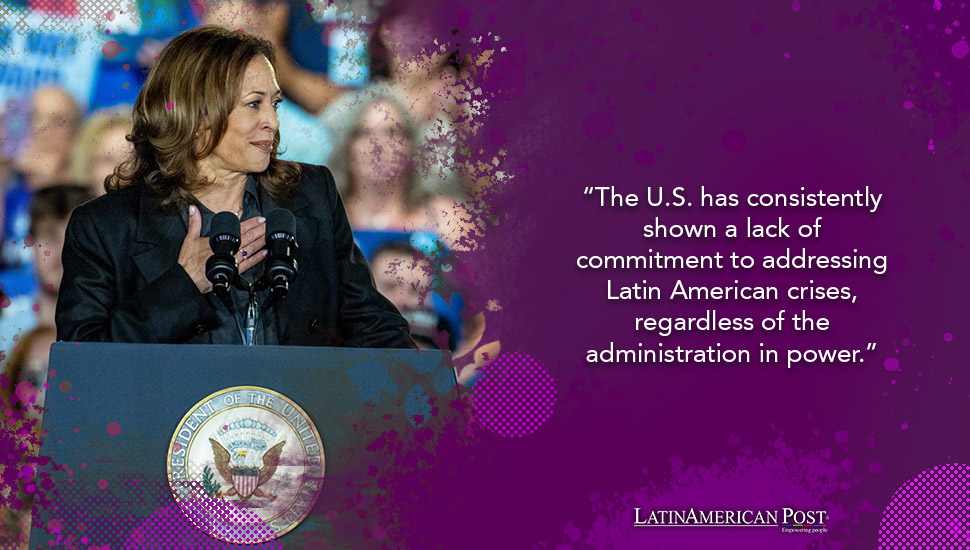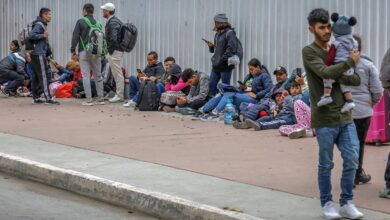U.S. Next President Likely to Overlook Latin America’s Vital Role

Last week’s debate between Kamala Harris and Donald Trump brought the usual sparks, but one glaring omission remained: Latin America. While other global issues took center stage, the region that most directly impacts the U.S. was again neglected.
A History of Neglect
The debate between Democratic candidate Kamala Harris and former president Donald Trump should have been an opportunity to address pressing global issues, including those impacting the Americas. However, while Ukraine, Gaza, and Afghanistan were extensively discussed, the lack of focus on Latin America—a region that significantly affects the U.S. in terms of immigration, trade, and security—was a stark reminder that, regardless of who occupies the White House, Latin America seems to remain a low priority.
Trump’s nonsensical claim about Haitian immigrants eating American pets in Ohio grabbed headlines for its absurdity, but it overshadowed critical foreign policy matters. Neither Harris nor Trump mentioned the increasingly dictatorial regimes in Venezuela, Nicaragua, and Cuba—governments whose human rights abuses and economic mismanagement have driven millions of refugees to the U.S. This ongoing crisis, which has clear implications for U.S. immigration and foreign policy, was left untouched. The broader issue is that the U.S. has consistently shown a lack of commitment to addressing Latin American crises, regardless of the administration in power.
Brutal Regimes Ignored
Venezuela, once one of Latin America’s wealthiest nations, is now facing a humanitarian disaster under the rule of Nicolas Maduro. The country’s economy has collapsed, with it, the hope for a democratic future. More than 8 million Venezuelans have fled, seeking refuge in neighboring countries and the U.S., creating a migration crisis that directly affects American borders. Despite this, the debate failed to mention Maduro’s theft of elections and the violent repression that has left millions without a voice or a homeland.
The dictatorships of Nicaragua’s Daniel Ortega and Cuba’s Miguel Díaz-Canel are no different. Ortega’s Nicaragua has turned into a brutal regime that suppresses dissent and violates fundamental human rights, while Cuba’s authoritarian government continues to imprison political opponents and stifle freedom. Both countries have sent a steady stream of asylum seekers to the U.S.. Yet, neither candidate thought to discuss the implications of these regimes on U.S. immigration and human rights policies.
Even when Trump briefly mentioned Venezuela, he only did so to spread the false narrative that the country was emptying its prisons to flood the U.S. with criminals posing as migrants. His assertion that Venezuela is now a safer country because of this is not only incorrect but ignores the ongoing humanitarian crisis that is driving millions to flee. The omission of severe discussions on these regimes highlights how disconnected U.S. foreign policy debates are from the issues that genuinely matter to millions of Americans.
Mexico’s Brewing Autocracy
Perhaps even more glaring than the omission of Venezuela, Nicaragua, and Cuba was the complete silence on Mexico. As the U.S.’s largest trading partner, Mexico plays a critical role in the American economy. Yet, no one mentioned the judicial reforms in Mexico that have the potential to dismantle the country’s democratic institutions. President Andres Manuel Lopez Obrador’s new reforms concentrate power in his hands, threatening to turn Mexico into Latin America’s largest elected autocracy.
Mexico’s political trajectory should be of great concern to the U.S. Not only is the country a significant trade partner, but it also sits on the doorstep of America’s southern border, serving as a buffer for immigration and security challenges. The judicial reforms in Mexico signal a return to authoritarianism, and the consequences for U.S.-Mexico relations, trade, and border security could be profound.
Lopez Obrador’s consolidation of power could open the door for Russia or China to increase their influence in Mexico, further complicating an already tense geopolitical landscape. Yet, during the debate, Harris and Trump ignored these developments, missing an opportunity to discuss how the U.S. should respond to the erosion of democracy in its neighbor to the south. The risks are clear: If Mexico becomes an autocracy, the U.S. could lose a vital trading partner and face increased security threats at its border.
Immigration: Absurd Claims Over Solutions
Instead of addressing these fundamental concerns, Trump leaned into a bizarre and racist claim that Haitian migrants in Ohio were eating American dogs and cats. The statement, devoid of truth and grounded in fear-mongering, distracted from meaningful dialogue on how to address immigration from Latin America.
Immigration has long been a focal point of U.S. domestic policy, but it is inextricably tied to the political and economic crises in Latin America. As countries like Venezuela and Nicaragua implode under authoritarian rule, their citizens have few options but to seek refuge in the U.S. The current wave of migrants arriving at the U.S. border is not just a domestic issue but a foreign policy challenge rooted in the failures of U.S. diplomacy in the region. For decades, successive administrations—Democratic and Republican alike—have failed to meaningfully engage with Latin American governments in ways that promote stability and prosperity.
While Trump’s fear-mongering claims about immigrants grabbed attention, the debate provided no substantive discussion on how to address the root causes of migration, such as political instability, corruption, and economic despair in Latin America. Harris, for her part, missed an opportunity to challenge Trump’s falsehoods with real solutions, opting instead to avoid the subject altogether. This silence speaks volumes about how little attention the U.S. is willing to pay to its southern neighbors, even as immigration remains one of the most pressing issues in American politics.
Why Latin America Deserves More Attention
The debate’s failure to address Latin America reflects a broader problem in U.S. foreign policy: the region has consistently been on the back burner. From trade to immigration to security, Latin America plays a pivotal role in American daily life, yet it remains a low priority for U.S. politicians. This oversight is not new. For decades, U.S. administrations have adopted a reactive, rather than proactive, approach to Latin America, often stepping in only when crises erupt but doing little to foster long-term stability.
The stakes are too high for this neglect to continue. Latin America’s economic potential, particularly in trade, makes it a vital partner for the U.S. Meanwhile, the political instability in countries like Venezuela, Nicaragua, and Mexico threatens to exacerbate migration issues, create security risks, and disrupt U.S. economic interests. Ignoring the region allows authoritarian regimes to flourish, further destabilizing the hemisphere and forcing millions of refugees to flee to the U.S.
Also read: Kamala Harris’ Ambiguous Stance on Latin America Amid Ongoing Crises
It’s time for U.S. politicians to recognize that Latin America is not just a neighbor but a crucial partner. Whether addressing the migrant crisis, promoting democracy, or securing trade agreements, the U.S. must prioritize Latin America in its foreign policy agenda. Otherwise, the cycle of instability and neglect will continue to the detriment of both regions.





